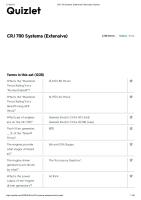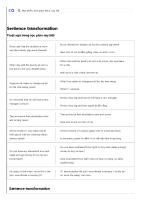Quizlet POPM [PDF]
Product Owner/ Product Manager(POPM) SAFe Agile Study online at quizlet.com/_5p0iid 1. Acceptance criteria is created b
26 0 73KB
Papiere empfehlen
![Quizlet POPM [PDF]](https://vdoc.tips/img/200x200/quizlet-popm.jpg)
- Author / Uploaded
- promethuschow
Datei wird geladen, bitte warten...
Zitiervorschau
Product Owner/ Product Manager(POPM) SAFe Agile Study online at quizlet.com/_5p0iid 1.
Acceptance criteria is created by what two positions?
The Team and the PO
22.
Collocated with and reports into development
Product Owner
2.
Accepts iteration increments
Product Owner
23.
3.
these agile items define the system and solution intent
Epic, Capability, Feature and story
Collocated with and reports into marketing/business
Product Manager
24.
Vision
4.
all big ideas are welcome here!
Funnel
communitcates strategix intent, and readies the Agile Release Train for launch
5.
Allocates and assure Lean budgets to strategy Closes the loop on funding and program execution KPIs and compliance
Lean Portfolio Management(LPM)
25.
Constantly updates feature priorities using WSJF
Product Management
26.
Epic
Answers, For whom does it provide them?
The vision
Container for a solution development initiative large enough to require analysis the definition of a MVP and finacial approval prior to implementation.
27.
Answers, What features and benefit hypothesis does it provide?
The Vision
Contains some of the vision and is the destination for new elements
Solution intent
28.
8.
Answers, what nonfunctional requirements does the solution drive?
The vision
continuously communicate emerging requirements and opportunities back into the program vision
Product Owner
9.
Answers, what problems does it solve?
the vision
29.
Vision
Portfolio Backlog
10.
Answers where are we headed with this Product or Solution?
Continuous prioritization of approved epics using WSJF
30.
Done
Solution backlog
11.
Anticipated outcome hypothesis evaluated pivot or persevere decision made
Contributes direction and guidance to the vision
31.
Contributes to Vision and program backlog; owns team backlog and implementation
Product Owner
12.
Applies basic scientific practice
Plan-Do-CheckAdjust
32.
Contribute to intentional architecture owns emergent design
Team
13.
approving stories into the team backlog and accepting them into the system baseline are the responsibility of?
Product Owner
33.
Cost estimate Identify MVP
Analyzing
34.
Cost savings Marketplace changes
Funnel
14.
These are the primary means of expressing needed functionality...
User stories
35.
Customer Collaboration
15.
ART Should have a max of how many people?
125
Over Contract negotiation
36.
Defines Features PIs and Releases
Assists with planning and helps limit WIP
Velocity
Product Manager
37.
Defines iterations and stories
Associated with backlogs at all four configurations of SAFe
Nonfunctional requirements
Product Owner
38.
Vision
Because stores focus on the user as the subject of interest, and not the system, user stories are?
Value centric
describes markets , customer segments and user needs.
39.
Describe the early measures that will help predict the business outcomes
Leading indicators
19.
Blue on a Kanban is?
Epics
40.
Directly deliver business value
20.
Brings structure to analysis
Portfolio Kanban System
business epics
21.
Collaborates on Enablers
Product Manager
6.
7.
16.
17.
18.
Doesnt operate in a strict linear sequence, learning cycle that allows teams to establish a # of hypotheses, build and deliver against them,measure results and learn from work
Continuous deliery pipeline
60.
Have the responsibility to provide the direction for roadmap nexxt steps
Product and solution management
61.
Helps drive collaboration among the key stakeholders
Portfolio Kanban System
42.
Drives iteration Goals and iteration content via prioritized stories
Product Owner
62.
Helps prevent unrealistic expectations
Portfolio Kanban System
43.
Drives PI objectives and content via prioritized features and enablers
Product Manager
63.
Holds Epics approved for implementation
Portfolio Backlog
44.
Drives the iteration
Product Owner
45.
Drives the Release and PIs
Product Manager
64.
How do you calculate the Cost of delay?
Product Management
Add User and business value + Time criticality + Risk reduction and opportunity enablement
46.
During _______________ PI Planning, teams commit to meeting the program PI objectives for the next PI.
PI Planning
47.
During PI planning the present the top 10 to the Team
65.
How do you calculate the WSJF?
Embraces the highly iterative hypothesize build measure learn cycle, which fits quite naturally into SAFe
Lean Startup movement
CoD Divided by Job size
48.
66.
NFRS
49.
Epic approved by LPM team
Portfolio Backlog
Identifies any nonfunctional requirements associated with the epic
Epic hypothesis statement
Reviewing
67.
51.
Epic owner Resonsibilities
Work with
52.
Epic owners and product and solution management decompose epics into solution/program epics, capabilities and features
Implementing
Implemented to breakdown silos and empower each agile team, art, and solution Train to continuously deliver new features to end users
Devops
50.
68.
Includes refactors and redesigns in backlog
Product Owner
69.
Solution Context
53.
Epic tracking continues
Implementing
Indicates how the solution interacts with the customers context
54.
Establishes Story acceptance criteria, accepts stories into the base line
Product Owner
70.
Individuals and interactions
over processes and tools
55.
Exists on the spanning Palette in the SAFe Big Picture and so can exist at all levels of the framework
Roadmap and its attributes
71.
In Safe, the is a role not a job.
Epic Owner
72.
integrate with other teams
Team
____for an iteration is equal to the sum of points for all the completed stories that met their definition of done (DoD)
Team's capacity
73.
Is a description of the future state of a solution
the Vision
74.
The vision
57.
Function that is responsible for strategy and investment funding, Agile program exection, KPIs, and Compliance.
Lean Portfolio Management(LPM)
Is a description of the future state of the solution under development
75.
Lean Portfolio Management(LPM)
58.
General Plan of when business and enabler features will be delivered over the next three PIs
Roadmap and its attributes
is a function that is responsible for strategy and investment funding, Agile program execution, KPIs and compliance
59.
Have the responsibility for translating the portfolio vision to a solution vision, indicating the reason and direction behind the chosen solution
Product and solution management
41.
56.
76.
Iteration goals serve which three purposes?
-Agile team members to a common purpose -Align Program Teams to common PI objectives and manage dependencies -Provide continuous management information
91.
Only ______ Can plan and commit to a course of action, one that summarized in the PI objectives
The Team
92.
Only the first PI is committed; the others are a forecast which will be adjusted based on the learning from initial PI
Roadmap and its attributes
93.
Owns Pricing, Licensing, and ROI
Product Manager
94.
Owns program backlog
Product Manager
95.
Owns Team Backlog
Product Owner
96.
Own story estimates and implementation of value
Team
97.
Owns Vision and Roadmaps, pricing, licensing, ROI and Program Backlog
Product Manager
98.
The portfolio Kanban system is tightly connected to the cadence of what?
Agile Release Trains
99.
Primary artificate used to define system behavior in Agile.
Stories
100.
The procecss that takes validated features from continuous integration and deploys them into the production environment where they are tested and readied for release
Continuous deployment
77.
It is created by the project manager
Roadmap and its attributes
78.
Key Architecture concerns
Non functional requirement
79.
Lean Business case Wip Limit Go/No-go decision
Analyzing
Makes largest business initiatives visible
Portfolio Kanban System
Manages the flow of Epics
Portfolio Kanban System
Market/Customer facing and identifies market needs
Product Manager
These may bot directly touch any end user. can support exploration, architecture or infrastructure.
Enabler stories
84.
Mergers and aquisition Problems with existing solutions
Funnel
101.
THe process by which depolyed features are released to customers incrementally or immediately based on market demands
Release on demand
85.
Must be analyzed before being vommitted to implmentation
Epic
102.
Continuous exploration
86.
Name four common vision formats.
Rolling wave briefings vision document preliminary data sheet draft press release
The process of constantly exploring market and user needs and defining a vision, roadmap, and set of features that address them
103.
Continuous integration
name the three different inputs to PI planning?
Business context Roadmap/vision Top 10 features from the single ART Program Backlog
The process of taking features from the program backlog and developing, testing, integrating, and validating them in a staging environment that prepares them for deployment and release
104.
_________ providee clarity, commitment and management information
Iteration goals
80.
81.
82.
83.
87.
88.
New business opportunities
Funnel
105.
Provide fat feedback and have intimate knowledge of what is needed
Customers
89.
Often Derived from the Vision
Roadmap and its attributes
106.
Provides a transparent and quantitative basis for economic decision-making
90.
Once the feature has been estimated in story points, How do you derive a cost estimate?
Calculate the burdened cost for a team in an iteration length and divide that by their PI velocity to get the average cost per story point.
Portfolio Kanban System
107.
Provides direction and serves as a decision making filter
Strategic themes
108.
Provides WIP limits to ensure that the teams analyze responsibly
Portfolio Kanban System
109.
The purpose is filled by what?
Roadmap
110.
Red on a Kanban is?
Enablers
111.
Refine understanding Calculate WSJF WIP Limit
Reviewing
112.
Responding to change
over following a plan
113.
Responsible for driving individual epicsfrom identification through the analysis process of the portfolio kanban system and on to the go/nogo decision, then all the way through implementation.
Epic Owner
114.
Responsible for working with Product and solution management and system Architect to define MVP
Epics Owner and Enterprise Architect
115.
schedule of events and milestone that communicate planned solution deliverables over a timeline.
Roadmap
116.
Sets boundaries and context for new features NFRs and other work
The Vision
117.
Shepard enabler epics that support the technical considerations for business epics.
Enterprise Architects
118.
Short descriptions of a small piece of desired functionality, written in the users language
Stories
119.
Solution Alternatives Refine WSJF
Analyzing
120.
Solution, technology and team facing
Product Owner
121.
Sometimes known as ilities. IE reliability, usability, scalability, maintainability, etc
Nonfunctional requirements
122.
States the economic or other benefit outcome the business can anticipate if the hypothesis is proven to be correct
Business Outcomes Hypothesis
123.
The structure "for who the" describes teh epic in general terms
Value Statement
124.
support the continuous evolution of the Architectural runway supports current and near term features
Architect/Engineer
125.
System qualities that support end-user functionality and system goals
Nonfunctional requirements
126.
They are not requirements, instead they are short simple descriptions of functionality usually told from the user's perspective and written in their language.
Stories
127.
This Starts with an outcome hypothesis
The Lean UX
128.
Used to advance the Architectual Runway.
Enabler Epics
129.
Used to deliver functionality directly to the end user.
Stories
130.
Used to estimate how long it takes to deliver epics, features, capabilities and enablers, which are also foretasted using story points.
Velocity
131.
Used to explore the scope of features, their benefit hypothesis and acceptance criteria.
Program Kanban
132.
What allows Agile release trains(Arts) and solution trains to manage capacity based on the work in progress(WIP) limit of different states of the process?
The Kanban system
133.
What are common formats for the vision?
-Rolling wave briefings -Vison documents preliminary data sheet -Draft press release
134.
What are epics splint into?
Features
135.
What are examples of non economic based prioritization?
-Hippo- Highest paid person makes the decision. "The Senior VP said we should do this project" -Squeaky Wheel - The person who yells the loudest or makes the biggest promise of revenue. "Fund my project and we will make a billion dollars" -ROI - Making a decision based exclusively on an ROI metric. Requires a sensitivity analysis to be relevant. "The NPV indicates we will make a 30% profit"
136.
What are Key Architecture concerns
Non Functional requirements
137.
What are methods used to visualize and manage the flow of value from ideation to analysis, implementation, and release?
The program and solution Kanban
138.
what are the different forms of input to the solution and program vision?
Customer feedback Architect, system team other Strategic themes Solution backlog NFR Solution context Solution intent Solution/ product management Team inputs/ Agile team Product owner
139.
What are the four parts of strategy and investment funding collaboration?
Enterprise executives LPM Enterprise Architect Business owners
140.
what are the four parts to Lean governance collaboration?
LPM Agile PMO Enterprise executives Business owners and stakeholders
141.
What are the three Cs of a story?
Card Conversation Confirmation
142.
What are the three parts to the Agile Program Guidance?
Agile PMO/LACE RTE & STE LPM
143.
What are the two things you need to know to prioritize based on lean economics?
What is the cost of delay(COD) in delivering value? What is the cost to implement the valuable thing?
144.
what are two primary outputs to PI planning?
Commtted PI Objectives (SMART) Program Board
145.
WHat does Partnering with system Architect/Engineering do?
Support Enabler items that provide sufficient architectural runway Work with system and solution Architects/engineering to sequence technical infrastructures that will enable delivery of new business functionality
146.
What holds Epics approved for implementation?
Portfolio Backlog
147.
What increases visibility into existing and upcoming work, and better understand the flow of work? Ensures continuous refinement of new value definition and acceptance criteria Fosters role Collaboration across disciplines, functions and levels?
Program and solution Kanban
148.
What is used by the ART to facilitate the flow of features through the continuous delivery pipeline?
Program Kanban
149.
What model does Lean Startup movement embrace?
hypothesize-build-measurelearn
150.
What prevents the system from operating with large handoffs and identifies bottlenecks and opportunities for improvement?
The Kanban and WIP limits
151.
What two things do Epics require?
Epic Owner and Lean Business Case
152.
When an Epic is accepted for implementation...
Epic Owner works with ART developement team and PM to initiate the development activites
153.
where do features come from?
Through preparation of epics for MVP Product Owners Architectural runway Emerge locally from the ARTLLP
154.
Who can be an epic owner
anyone
155.
Who does the product manager collaborate withto build the architectural runway?
System Architects
156.
Who do you work with to sequence technical infrastructures that will enable delivery of new business functionality?
System and Solution Architects/Engineering
157.
Who give the Go/no-go decision for a lean business case?
LPM
158.
WIP limited by downstream capacity Teams begin implementing at program increment boundaries
implementing
159.
Work directly with the business owners and other stateholders to synthesize all inputs and integrate them into a holistic and cohesive vision
Product and solution Management
160.
Working Software
Over Comprehensive documentation
161.
Work with Stakeholders and SME to define the Epic and its hypothesis statement, establish the cost of delay, and identify business sponsers Work with Development teams to size the Epic and provide input for economic prioritization. Define Epic Outcomes hypothesis and MVP Guide the Epics through the Portfolio Kanban system and create the Lean Business Case Present the Epic, including the business case, to the LPM for go/no-go decision
Responsibilities of Epic Owner





